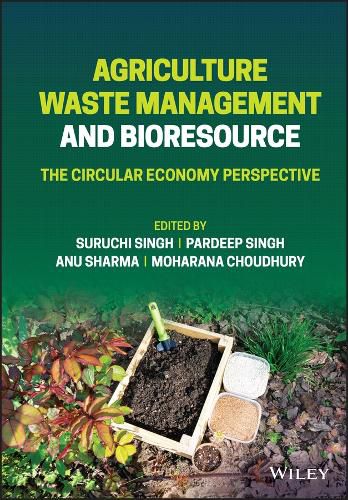Readings Newsletter
Become a Readings Member to make your shopping experience even easier.
Sign in or sign up for free!
You’re not far away from qualifying for FREE standard shipping within Australia
You’ve qualified for FREE standard shipping within Australia
The cart is loading…






Comprehensive resource detailing the generation of agricultural waste and providing insight into waste management
Agriculture Waste Management and Bioresource provides thorough coverage of the generation of agricultural waste with essential thought leadership about various options in managing the waste, including composting, vermicomposting to form manure and biogas generation. Readers take a crucial step toward more sustainable development and to create a greener planet.
The text includes a wide range of information regarding resource recovery from the waste of the agriculture sector, energy generation, biofuels, reduction in the amount and volume of waste through circular economy, and much more. The authors place particular importance on understanding and managing agricultural waste concerning the sustainability of the environment in the era of global climate change.
Topics covered in Agriculture Waste Management and Bioresource include:
Categories and amounts of agricultural wastes seen in a worldwide perspective and current challenges and perspectives in handling agricultural wastes State-of-the-art processing technologies relevant for agricultural wastes categories and sustainable methods used for management of agricultural biomass Bioethanol production from lignocellulose waste of agricultural waste biomass and biogas production through anaerobic digestion of agricultural wastes Mechanical and chemical processing, aerobic and anaerobic treatment, other biological processing methods, and thermal processing
Academics, students, and industry professionals in environmental science and engineering, waste management, and agriculture can use the valuable insight in Agriculture Waste Management and Bioresource to understand the latest in the field and the advancements that can propel us towards a better and more sustainable future.
$9.00 standard shipping within Australia
FREE standard shipping within Australia for orders over $100.00
Express & International shipping calculated at checkout
Comprehensive resource detailing the generation of agricultural waste and providing insight into waste management
Agriculture Waste Management and Bioresource provides thorough coverage of the generation of agricultural waste with essential thought leadership about various options in managing the waste, including composting, vermicomposting to form manure and biogas generation. Readers take a crucial step toward more sustainable development and to create a greener planet.
The text includes a wide range of information regarding resource recovery from the waste of the agriculture sector, energy generation, biofuels, reduction in the amount and volume of waste through circular economy, and much more. The authors place particular importance on understanding and managing agricultural waste concerning the sustainability of the environment in the era of global climate change.
Topics covered in Agriculture Waste Management and Bioresource include:
Categories and amounts of agricultural wastes seen in a worldwide perspective and current challenges and perspectives in handling agricultural wastes State-of-the-art processing technologies relevant for agricultural wastes categories and sustainable methods used for management of agricultural biomass Bioethanol production from lignocellulose waste of agricultural waste biomass and biogas production through anaerobic digestion of agricultural wastes Mechanical and chemical processing, aerobic and anaerobic treatment, other biological processing methods, and thermal processing
Academics, students, and industry professionals in environmental science and engineering, waste management, and agriculture can use the valuable insight in Agriculture Waste Management and Bioresource to understand the latest in the field and the advancements that can propel us towards a better and more sustainable future.